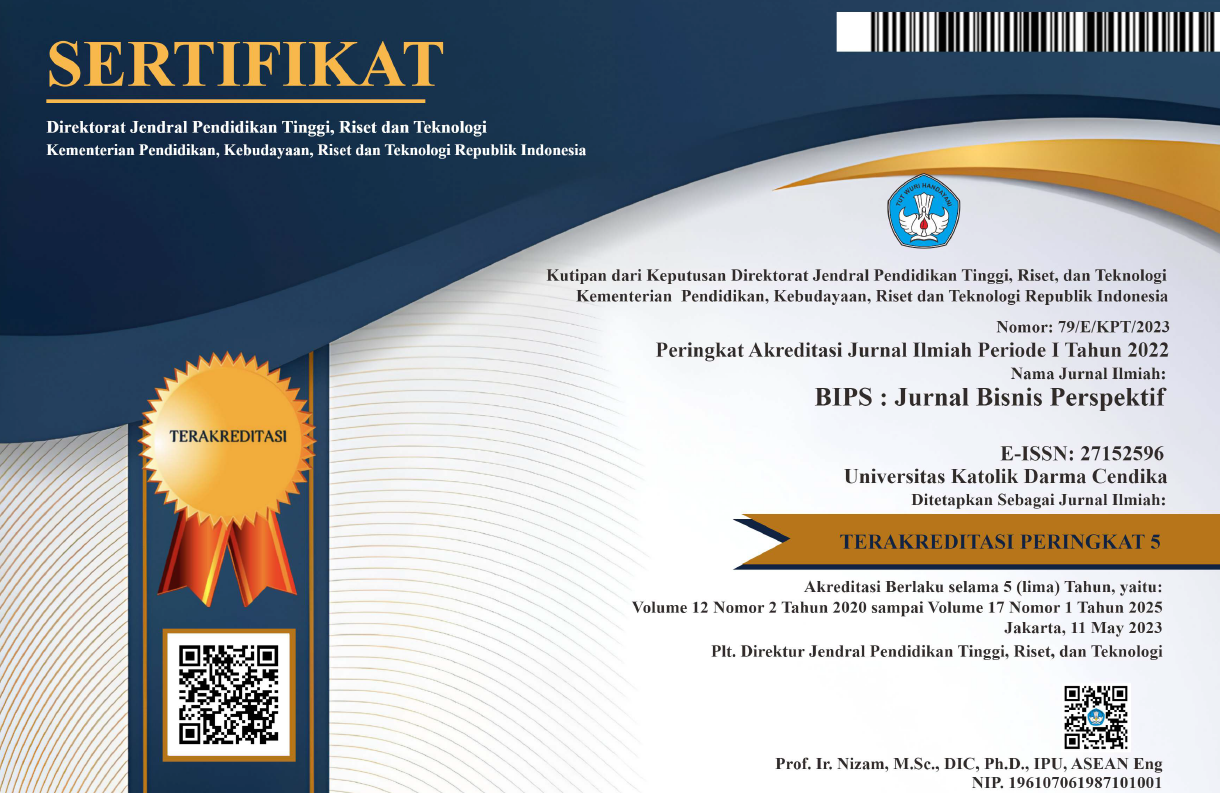The Influence of Entrepreneurship Education and Its Implementation
DOI:
https://doi.org/10.37477/bip.v16i2.554Keywords:
entrepreneurship education, entrepreneurial capacity, entrepreneurial passion, entrepreneurial intentionsAbstract
Research related to entrepreneurial education (EU) and its implementation is very important to develop entrepreneurial abilities. Therefore, this research was conducted to determine the influence of EU and its implementation in relation to entrepreneurial capacity (EC), entrepreneurial passion (EP) and entrepreneurial intentions (EI). EC is a person's ability to find, recognize and absorb opportunities before undertaking. Furthermore, PE is the motivating force to influence the recognition by seeing opportunities, the vision, the mission, the decisions and the perseverance to get involved in the business to be built. Furthermore, PE is a person's thinking to form new business concepts and have a career in it. world of entrepreneurship. This research uses a literature study method by reviewing the results of previous research following the steps: (1) identify the research topic to be studied; (2) collect library sources that are relevant to the research topic; (3) read and analyze these library sources comprehensively; (4) identify findings and information relevant to the research topic; (5) organize and compile the findings in the form of a research report. The results of this research show that the EU in its implementation influences the EC, the EP and the EI. Furthermore, this research shows that the EU, EC and EP influence EI. Therefore, educational institutions that want to develop entrepreneurial skills can implement a curriculum based on project-based learning and problem-based learning so that students can directly experience concrete entrepreneurial learning in terms of knowledge, skills and experience. so that they can increase their entrepreneurial intentions and can even develop the business that they have been running since they were students.
References
Adu, I. N., Boakye, K. O., Suleman, A.-R., & Bingab, B. B. B. (2020). Exploring the factors that mediate the relationship between entrepreneurial education and entrepreneurial intentions among undergraduate students in Ghana. Asia Pacific Journal of Innovation and Entrepreneurship, 14(2), 215–228. https://doi.org/10.1108/apjie-07-2019-0052.
Alamsyahrir, D., & Ie, M. (2022). Technopreneurial intention: peran self-efficacy, entrepreneurship education, dan relation support. Jurnal Manajemen Maranatha, 21(2), 135–144. https://doi.org/10.28932/jmm.v21i2.4532.
Angeline, & Puspitowati, I. (2023). Pengaruh Entrepreneurial Alertness dan Entrepreneurial Self-Efficacy terhadap Entrepreneurial Intention pada Mahasiswa. Jurnal Manajerial Dan Kewirausahaan, 05(01), 1–9.
Bandera, C., Santos, S. C., & Liguori, E. W. (2021). The Dark Side of Entrepreneurship Education: A Delphi Study on Dangers and Unintended Consequences. Entrepreneurship Education and Pedagogy, 4(4), 609–636. https://doi.org/10.1177/2515127420944592.
Boubker, O., Arroud, M., & Ouajdouni, A. (2021). Entrepreneurship education versus management students’ entrepreneurial intentions. A PLS-SEM approach. International Journal of Management Education, 19(1). https://doi.org/10.1016/j.ijme.2020.100450.
Cahyo, S. D. (2022). Hubungan Antara Entrepreneurial Passion, Entrepreneurship Education Dan Creativity Terhadap Entrepreneurial Intention: Peran Perceived Risk Sebagai Moderator. Journal Economic Insights, 1(2).
Cassol, A., Tonial, G., Machado, H. P. V., Dalbosco, I. B., & Trindade, S. (2022). Determinants of entrepreneurial intentions and the moderation of entrepreneurial education: A study of the Brazilian context. International Journal of Management Education, 20(3). https://doi.org/10.1016/j.ijme.2022.100716.
Dheer, R. J. S., & Castrogiovanni, G. J. (2023). Cognitive adaptability’s impact on entrepreneurial intent: The mediating roles of entrepreneurial passion and efficacy. Journal of Business Research, 160. https://doi.org/10.1016/j.jbusres.2023.113798.
Fiore, E., Sansone, G., & Paolucci, E. (2019). Entrepreneurship education in a multidisciplinary environment: Evidence from an entrepreneurship programme held in turin. Administrative Sciences, 9(1). https://doi.org/10.3390/admsci9010028.
Handiman, U. T., Herdiyanto, H., Affini, D. N., Faridi, A., & Sutawijaya, A. H. (2022). Bagaimana Subjective Norms dan Entrepreneurship Education Berpengaruh Terhadap Entrepreneurial Intention Mahasiswa? Jurnal Doktor Manajemen (JDM), 5(1), 79. https://doi.org/10.22441/jdm.v5i1.14741.
Hubner, S., Baum, M., & Frese, M. (2020). Contagion of Entrepreneurial Passion: Effects on Employee Outcomes. Entrepreneurship: Theory and Practice, 44(6), 1112–1140. https://doi.org/10.1177/1042258719883995.
Isma, A. (2022). Faktor-faktor Langsung dan Tak Langsung yang Memengaruhi Entrepreneurial Intention. In Bata Ilyas Journal of Accounting (Vol. 3, Issue1).
Kempa, S., & Bilviary, A. (2022). Studi Entrepreneurial Intention pada Mahasiswa di Maluku. Jurnal Ekonomi Pendidikan Dan Kewirausahaan, 10(1), 5–18. https://doi.org/10.26740/jepk.v10n1.p5-18.
Khairinal, K., Siti, S., & Fitriani. (2022). Pengaruh Lingkungan Keluarga, Pendidikan Kewirausahaan, dan Jiwa Kewirausahaan terhadap Minat Berwirausaha Siswa SMKN 1 Kota Jambi. Jurnal Manajemen Pendidikan Dan Ilmu Sosial, 3(1).
Kiani, A., Ali, A., Wang, D., & Islam, Z. U. (2022). Perceived fit, entrepreneurial passion for founding, and entrepreneurial intention. International Journal of Management Education, 20(3). https://doi.org/10.1016/j.ijme.2022.100681.
Li, C., Murad, M., Shahzad, F., Khan, M. A. S., Ashraf, S. F., & Dogbe, C. S. K. (2020). Entrepreneurial Passion to Entrepreneurial Behavior: Role of Entrepreneurial Alertness, Entrepreneurial Self-Efficacy and Proactive Personality. Frontiers in Psychology, 11. https://doi.org/10.3389/fpsyg.2020.01611.
Liñán, F., & Chen, Y.-W. (2009). Development and Cross-Cultural Application of a Specific Instrument to Measure Entrepreneurial Intentions. 593–617.
McSweeney, J. J., McSweeney, K. T., Webb, J. W., & Sandoval, R. G. (2022). Passion drove me here: Exploring how types of entrepreneurial passion influence different entrepreneurial intentions. Journal of Business Venturing Insights, 18. https://doi.org/10.1016/j.jbvi.2022.e00352.
Nguyen, Q. Do, & Nguyen, H. T. (2023). Entrepreneurship education and entrepreneurial intention: The mediating role of entrepreneurial capacity. International Journal of Management Education, 21(1). https://doi.org/10.1016/j.ijme.2022.100730.
Primandaru, N., & Adriyani, B. (2019). Pengaruh Entrepreneurial Education, Risk Tolerance dan Self Efficacy Terhadap Entrepreneurial Intention Pada Mahasiswa. Jurnal Bisnis & Manajemen, 19(1), 11–24.
Putrihapsari, R., & Fauziah, P. Y. (2020). Manajemen Pengasuhan Anak Usia Dini pada Ibu yang Bekerja : Sebuah Studi Literatur. VISI : Jurnal Ilmiah PTK PNF, 15(2), 127–136.
Stenholm, P., & Nielsen, M. S. (2019). Understanding the emergence of entrepreneurial passion: The influence of perceived emotional support and competences. International Journal of Entrepreneurial Behaviour and Research, 25(6), 1368–1388. https://doi.org/10.1108/IJEBR-02-2018-0065.
Sunardi. (2022). Kontribusi Entrepreneurial Passion dan Self-Efficacy terhadap Entrepreneurial Intention Siswa SMK Teknik Pemesinan. Jambura Economic Education Journal, 4(2).
Uddin, M., Chowdhury, R. A., Hoque, N., Ahmad, A., Mamun, A., & Uddin, M. N. (2022). Developing entrepreneurial intentions among business graduates of higher educational institutions through entrepreneurship education and entrepreneurial passion: A moderated mediation model. International Journal of Management Education, 20(2). https://doi.org/10.1016/j.ijme.2022.100647.
Untu, Y. I., & Widjaja, O. H. (2019). Pengaruh Need For Achievement Dan Self- Efficacy Terhadap Entrepreneurial Intention Pada Mahasiswa Fakultas Ekonomi Universitas Tarumanagara. Jurnal Manajerial Dan Kewirausahaan, 1(2), 374–382.
Yeodyra, D., & Handoyo, S. E. (2022). Pengaruh Entrepreneurship Education, Gender, Age, dan Family Background terhadap Entrepreneurial Intention pada Mahasiswa Universitas Tarumanagara. Jurnal Manajerial Dan Kewirausahaan, 04(04).
Downloads
Published
How to Cite
Issue
Section
License
Authors publishing in this journal agree to the following terms:
- The author retains copyright and grants the journal rights of first publication with the work simultaneously licensed under a Creative Commons Attribution ShareAlike License License that allows others to share the work with acknowledgment of the author's work and initial publication in BIP's: Journal of Business Perspectives.
- Authors may include separate additional contractual arrangements for non-exclusive distribution of the published version of the journal (e.g., submit to an institutional repository or publish in a book), with an acknowledgment of the original publication in this Journal.
- Authors are permitted and encouraged to post their work online (e.g., in institutional repositories or on their websites) before and during the submission process, as it can lead to productive exchanges, as well as citations of previously published work.
Each author is expected to complete the copyright process with a document of the originality of the manuscript, the templated document is below:


7.png)


6.png)
2.png)


